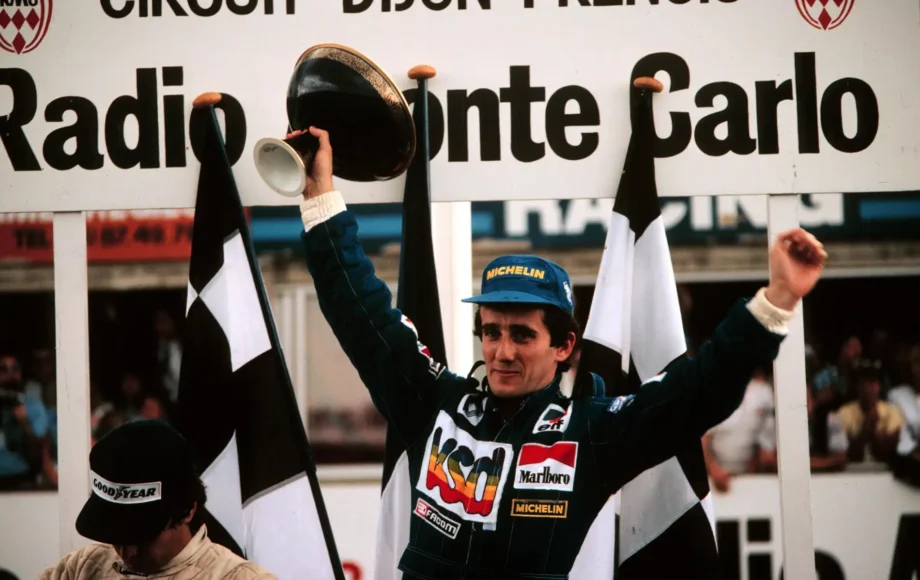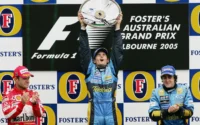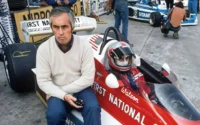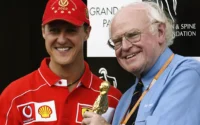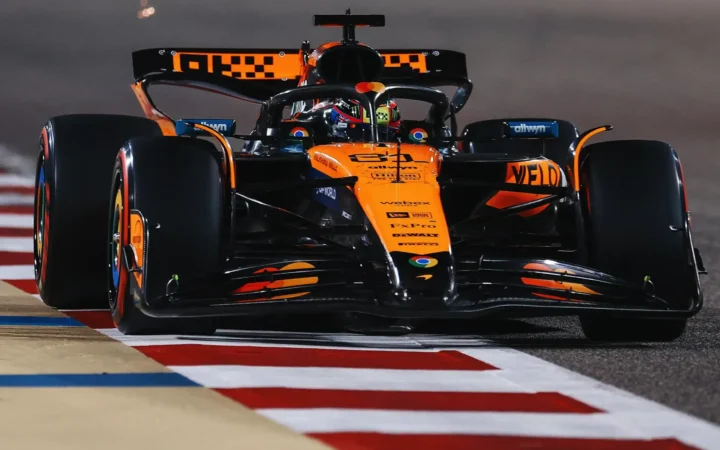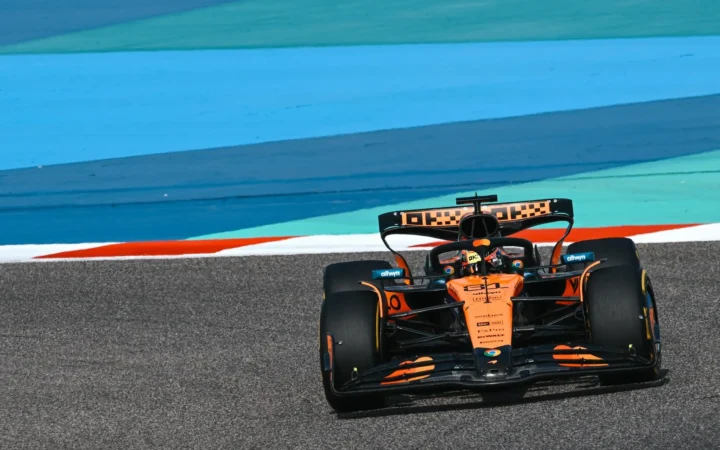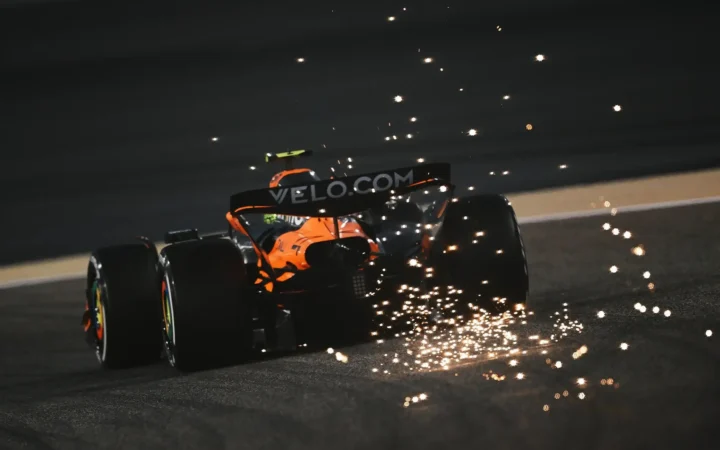What happened on this day, July 5 in Formula 1 history? Find out interesting facts and stories about Formula 1 on this day.
1953
After 300 miles of racing, the 1953 French Grand Prix was decided in the final straight when Mike Hawthorn in a Ferrari overtook Juan Manuel Fangio in a Maserati to clinch victory. With just a second separating the leading two cars, it was widely acclaimed as the best grand prix since the inception of the Formula One World Championship and marked the first win by a British driver. Throughout the season, a fierce battle for Italian pride raged between Ferraris and Maseratis, culminating at the Reims circuit.
Jose Froilan Gonzalez, driving a Maserati, took an early lead in his A6GCM, but his light fuel load forced him to pit, thrusting him back into a fierce contest with Fangio, Hawthorn, and Alberto Ascari in a Ferrari. The battle raged on for the entire race, with no driver able to gain a clear advantage. In the end, the top four cars crossed the finish line within five seconds of each other, a remarkable feat after 2 hours and 44 minutes of racing. Gonzalez finished third.
1953 French Grand Prix Race Results
| Pos | No | Driver | Car | Laps | Time/retired | Pts |
|---|---|---|---|---|---|---|
| 1 | 16 | Mike Hawthorn | Ferrari | 60 | 2:44:18.600 | 8 |
| 2 | 18 | Juan Manuel Fangio | Maserati | 60 | +1.000s | 6.5 |
| 3 | 20 | Jose Froilan Gonzalez | Maserati | 60 | +1.400s | 4 |
| 4 | 10 | Alberto Ascari | Ferrari | 60 | +4.600s | 3.5 |
| 5 | 14 | Nino Farina | Ferrari | 60 | +67.600s | 2 |
| 6 | 12 | Luigi Villoresi | Ferrari | 60 | +75.900s | 0 |
| 7 | 46 | Toulo de Graffenried | Maserati | 58 | +2 laps | 0 |
| 8 | 44 | Louis Rosier | Ferrari | 56 | +4 laps | 0 |
| 9 | 22 | Onofre Marimon | Maserati | 55 | +5 laps | 0 |
| 10 | 2 | Jean Behra | Gordini | 55 | +5 laps | 0 |
| 11 | 38 | Bob Gerard | Cooper Bristol | 55 | +5 laps | 0 |
| 12 | 48 | Johnny Claes | Connaught Lea Francis | 53 | +7 laps | 0 |
| 13 | 28 | Peter Collins | HWM Alta | 52 | +8 laps | 0 |
| 14 | 30 | Yves Giraud-Cabantous | HWM Alta | 50 | +10 laps | 0 |
| 15 | 32 | Louis Chiron | OSCA | 43 | +17 laps | 0 |
| NC | 24 | Felice Bonetto | Maserati | 42 | DNF | 0 |
| NC | 36 | Stirling Moss | Cooper Alta | 38 | DNF | 0 |
| NC | 42 | Prince Bira | Connaught Lea Francis | 29 | DNF | 0 |
| NC | 34 | Elie Bayol | OSCA | 18 | DNF | 0 |
| NC | 40 | Ken Wharton | Cooper Bristol | 17 | DNF | 0 |
| NC | 4 | Maurice Trintignant | Gordini | 14 | DNF | 0 |
| NC | 26 | Lance Macklin | HWM Alta | 9 | DNF | 0 |
| NC | 8 | Roberto Mieres | Gordini | 4 | DNF | 0 |
| NC | 6 | Harry Schell | Gordini | 4 | DNF | 0 |
| NC | 50 | Roy Salvadori | Connaught Lea Francis | 2 | DNF | 0 |
1959
Jean Behra’s promising career at Ferrari ended dramatically following a physical altercation with team manager Romolo Tavoni after the 1959 French Grand Prix at Reims. Fellow Ferrari driver Tony Brooks won the race, seemingly outperforming Behra in front of the Frenchman’s home fans. Behra eventually retired from the race due to a broken piston and returned to the pits, convinced that Ferrari had favoured Brooks over him.
In a heated discussion with Tavoni, Behra threw a punch at his boss and was immediately dismissed from the team. Less than a month later, Behra tragically died while racing a Porsche RSK Spyder at Avus. He lost control and flew off the top of the 45-degree banking at the Nordkurve, hitting a flagpole and dying instantly.
Brooks had dominated the race, leading all 50 laps and winning by 27 seconds over his American Ferrari teammate Phil Hill. Australian driver Jack Brabham was over a minute behind in third position driving a Cooper.
1959 French Grand Prix Race Results
| Pos | No | Driver | Car | Laps | Time/retired | Pts |
|---|---|---|---|---|---|---|
| 1 | 24 | Tony Brooks | Ferrari | 50 | 2:01:26.500 | 8 |
| 2 | 26 | Phil Hill | Ferrari | 50 | +27.500s | 6 |
| 3 | 8 | Jack Brabham | Cooper Climax | 50 | +97.700s | 4 |
| 4 | 22 | Olivier Gendebien | Ferrari | 50 | +107.500s | 3 |
| 5 | 12 | Bruce McLaren | Cooper Climax | 50 | +107.700s | 2 |
| 6 | 44 | Ron Flockhart | BRM | 50 | +125.700s | 0 |
| 7 | 6 | Harry Schell | BRM | 47 | +3 laps | 0 |
| DQ | 2 | Stirling Moss | BRM | 42 | DSQ | 1 |
| 8 | 40 | Giorgio Scarlatti | Maserati | 41 | +9 laps | 0 |
| 9 | 42 | Carel Godin de Beaufort | Maserati | 40 | +10 laps | 0 |
| 10 | 38 | Fritz d’Orey | Maserati | 40 | +10 laps | 0 |
| 11 | 14 | Maurice Trintignant | Cooper Climax | 36 | +14 laps | 0 |
| NC | 30 | Jean Behra | Ferrari | 31 | DNF | 0 |
| NC | 16 | Roy Salvadori | Cooper Maserati | 20 | DNF | 0 |
| NC | 28 | Dan Gurney | Ferrari | 19 | DNF | 0 |
| NC | 34 | Innes Ireland | Lotus Climax | 14 | DNF | 0 |
| NC | 18 | Ian Burgess | Cooper Maserati | 13 | DNF | 0 |
| NC | 10 | Masten Gregory | Cooper Climax | 8 | DNF | 0 |
| NC | 32 | Graham Hill | Lotus Climax | 7 | DNF | 0 |
| NC | 20 | Colin Davis | Cooper Maserati | 7 | DNF | 0 |
| NC | 4 | Jo Bonnier | BRM | 6 | DNF | 0 |
1970
Clermont Ferrand, one of the greatest Grand Prix circuits of all time, nearly lost the right to host the 1970 French Grand Prix. However, local supporters gathered enough funds to prevent the race from moving to Albi. Jochen Rindt claimed victory in front of massive crowds gathered on the hillsides. Jacky Ickx initially led the race, but his Ferrari’s flat-12 engine, which had sounded troubled on the way to the grid, failed 15 laps in. Jean Pierre Beltoise then took the lead but lost time due to a slow puncture, eventually conceding the position to Rindt. The Lotus driver went on to win the race. Chris Amon finished second for the March team and Brabham driver Jack Brabham came in third
Despite the locals’ efforts to keep the race at Clermont Ferrand, it moved to Paul Ricard the following year and returned only once more in 1972 before permanently dropping off the calendar.
1970 French Grand Prix Race Results
| Pos | No | Driver | Car | Laps | Time/retired | Pts |
|---|---|---|---|---|---|---|
| 1 | 6 | Jochen Rindt | Lotus Ford | 38 | 1:55:57.000 | 9 |
| 2 | 14 | Chris Amon | March Ford | 38 | +7.610s | 6 |
| 3 | 23 | Jack Brabham | Brabham Ford | 38 | +44.830s | 4 |
| 4 | 19 | Denny Hulme | McLaren Ford | 38 | +45.660s | 3 |
| 5 | 20 | Henri Pescarolo | Matra | 38 | +79.420s | 2 |
| 6 | 17 | Dan Gurney | McLaren Ford | 38 | +79.650s | 1 |
| 7 | 22 | Rolf Stommelen | Brabham Ford | 38 | +140.160s | 0 |
| 8 | 7 | John Miles | Lotus Ford | 38 | +167.170s | 0 |
| 9 | 1 | Jackie Stewart | March Ford | 38 | +189.610s | 0 |
| 10 | 8 | Graham Hill | Lotus Ford | 37 | +1 lap | 0 |
| 11 | 2 | Francois Cevert | March Ford | 37 | +1 lap | 0 |
| 12 | 4 | George Eaton | BRM | 36 | +2 laps | 0 |
| 13 | 21 | Jean-Pierre Beltoise | Matra | 35 | DNF | 0 |
| 14 | 11 | Ignazio Giunti | Ferrari | 35 | +3 laps | 0 |
| NC | 16 | Andrea de Adamich | McLaren Alfa Romeo | 29 | +9 laps | 0 |
| NC | 12 | Jo Siffert | March Ford | 23 | DNF | 0 |
| NC | 18 | Ronnie Peterson | March Ford | 17 | DNF | 0 |
| NC | 10 | Jacky Ickx | Ferrari | 16 | DNF | 0 |
| NC | 3 | Pedro Rodriguez | BRM | 6 | DNF | 0 |
| NC | 5 | Jackie Oliver | BRM | 5 | DNF | 0 |
1981
The 1981 French Grand Prix delivered a thrilling race, with two distinct halves and culminating in Alain Prost‘s first F1 victory. Nelson Piquet made an excellent start from the Dijon grid, leading the race ahead of John Watson, Prost, Andrea de Cesaris, and Gilles Villeneuve. While Prost’s Renault showed impressive speed, it took him several laps to overtake Watson’s McLaren, allowing Piquet to extend his lead.
On lap 58, heavy rain drenched the track, rendering it undriveable and prompting the stewards to stop the race. Fortunately, it was only a passing shower, and the eager organisers decided to restart the race from the grid in the positions the drivers held on lap 58. Prost quickly closed in on Piquet, eventually forcing his way past, followed closely by Watson, to secure his maiden victory. Watson took second and Piquet third.
1981 French Grand Prix Race Results
| Pos | No | Driver | Car | Laps | Time/retired | Pts |
|---|---|---|---|---|---|---|
| 1 | 15 | Alain Prost | Renault | 80 | 1:35:48.130 | 9 |
| 2 | 7 | John Watson | McLaren Ford | 80 | +2.290s | 6 |
| 3 | 5 | Nelson Piquet | Brabham Ford | 80 | +24.220s | 4 |
| 4 | 16 | Rene Arnoux | Renault | 80 | +42.300s | 3 |
| 5 | 28 | Didier Pironi | Ferrari | 79 | +1 lap | 2 |
| 6 | 11 | Elio de Angelis | Lotus Ford | 79 | +1 lap | 1 |
| 7 | 12 | Nigel Mansell | Lotus Ford | 79 | +1 lap | 0 |
| 8 | 22 | Mario Andretti | Alfa Romeo | 79 | +1 lap | 0 |
| 9 | 6 | Hector Rebaque | Brabham Ford | 78 | +2 laps | 0 |
| 10 | 2 | Carlos Reutemann | Williams Ford | 78 | +2 laps | 0 |
| 11 | 8 | Andrea de Cesaris | McLaren Ford | 78 | +2 laps | 0 |
| 12 | 33 | Marc Surer | Theodore Ford | 78 | +2 laps | 0 |
| 13 | 3 | Eddie Cheever | Tyrrell Ford | 77 | +3 laps | 0 |
| 14 | 29 | Riccardo Patrese | Arrows Ford | 77 | +3 laps | 0 |
| 15 | 23 | Bruno Giacomelli | Alfa Romeo | 77 | +3 laps | 0 |
| 16 | 4 | Michele Alboreto | Tyrrell Ford | 77 | +3 laps | 0 |
| 17 | 1 | Alan Jones | Williams Ford | 76 | +4 laps | 0 |
| NC | 26 | Jacques Laffite | Ligier Matra | 57 | DNF | 0 |
| NC | 17 | Derek Daly | March Ford | 55 | DNF | 0 |
| NC | 27 | Gilles Villeneuve | Ferrari | 41 | DNF | 0 |
| NC | 25 | Patrick Tambay | Ligier Matra | 30 | DNF | 0 |
| NC | 20 | Keke Rosberg | Fittipaldi Ford | 11 | DNF | 0 |
| NC | 14 | Eliseo Salazar | Ensign Ford | 6 | DNF | 0 |
1987
The 1987 French Grand Prix took place on July 5 at Circuit Paul Ricard, the sixth round of the 1987 Formula One World Championship. The Williams of Nigel Mansell secured pole with a time of 1:06.454, with McLaren’s Alain Prost alongside him on the front row. At the start, Mansell maintained his lead, while teammate Nelson Piquet moved ahead of Prost into second place. The Williams duo dominated the early stages, with Ayrton Senna‘s Lotus and Prost following closely. On lap 19, Piquet spun, allowing Prost to reclaim second. During the pit stops, Piquet managed to get ahead of both Prost and Mansell, but Mansell quickly retook second from Prost and closed up on Piquet. However, overtaking was another issue until Piquet made a mistake and ran wide on lap 46, allowing Mansell to take the lead. Mansell then maintained his position to secure victory, finishing 7.7 seconds ahead of Piquet. Prost completed the podium in third, while Senna finished fourth. Teo Fabi’s Benetton and Philippe Streiff’s Tyrrell rounded out the top six. The win was Mansell’s second victory of the season.
In the Drivers’ Championship standings, Senna retained the lead with 27 points, followed closely by Prost with 26, and Piquet with 24. Mansell’s victory elevated him to fourth place with 21 points. Williams led the Constructors’ Championship with 45 points, ahead of McLaren-TAG’s 39 and Lotus-Honda’s 30.
1987 French Grand Prix Race Results
| Pos | No | Driver | Car | Laps | Time/retired | Pts |
|---|---|---|---|---|---|---|
| 1 | 5 | Nigel Mansell | Williams Honda | 80 | 1:37:03.839 | 9 |
| 2 | 6 | Nelson Piquet | Williams Honda | 80 | +7.711s | 6 |
| 3 | 1 | Alain Prost | McLaren TAG | 80 | +55.255s | 4 |
| 4 | 12 | Ayrton Senna | Lotus Honda | 79 | +1 lap | 3 |
| 5 | 19 | Teo Fabi | Benetton Ford | 77 | +3 laps | 2 |
| 6 | 4 | Philippe Streiff | Tyrrell Ford | 76 | +4 laps | 1 |
| 7 | 3 | Jonathan Palmer | Tyrrell Ford | 76 | +4 laps | 0 |
| 8 | 2 | Stefan Johansson | McLaren TAG | 74 | DNF | 0 |
| 9 | 14 | Pascal Fabre | AGS Ford | 74 | +6 laps | 0 |
| NC | 28 | Gerhard Berger | Ferrari | 71 | DNF | 0 |
| NC | 11 | Satoru Nakajima | Lotus Honda | 71 | +9 laps | 0 |
| NC | 27 | Michele Alboreto | Ferrari | 64 | DNF | 0 |
| NC | 17 | Derek Warwick | Arrows Megatron | 62 | DNF | 0 |
| NC | 30 | Philippe Alliot | Lola Ford | 57 | DNF | 0 |
| NC | 16 | Ivan Capelli | March Ford | 52 | DNF | 0 |
| NC | 23 | Adrian Campos | Minardi Motori Moderni | 52 | DNF | 0 |
| NC | 25 | Rene Arnoux | Ligier Megatron | 33 | DNF | 0 |
| NC | 20 | Thierry Boutsen | Benetton Ford | 31 | DNF | 0 |
| NC | 10 | Christian Danner | Zakspeed | 26 | DNF | 0 |
| NC | 26 | Piercarlo Ghinzani | Ligier Megatron | 24 | DNF | 0 |
| NC | 24 | Alessandro Nannini | Minardi Motori Moderni | 23 | DNF | 0 |
| NC | 7 | Riccardo Patrese | Brabham BMW | 19 | DNF | 0 |
| NC | 9 | Martin Brundle | Zakspeed | 18 | DNF | 0 |
| NC | 21 | Alex Caffi | Osella Alfa Romeo | 11 | DNF | 0 |
| NC | 8 | Andrea de Cesaris | Brabham BMW | 2 | DNF | 0 |
| NC | 18 | Eddie Cheever | Arrows Megatron | 0 | DNF | 0 |
1992
Similar weather conditions to the 1981 race led to another 1992 French Grand Prix being split into two halves, this time at Magny-Cours. Riccardo Patrese led the first half in the dominant Williams, ahead of his teammate Nigel Mansell, but his lead evaporated with the mid-race downpour. At the restart, Mansell was right behind Patrese, and the Italian eventually and quite obviously waved him through. After the race, Mansell sidestepped questions about whether Patrese had let him pass: “I think it was the biggest casino of a race that we have had with regards to the weather. I must compliment Riccardo because the first race was great and it was a shame that it was stopped.”
1992 French Grand Prix Race Results
| Pos | No | Driver | Car | Laps | Time/retired | Pts |
|---|---|---|---|---|---|---|
| 1 | 5 | Nigel Mansell | Williams Renault | 69 | 1:38:08.459 | 10 |
| 2 | 6 | Riccardo Patrese | Williams Renault | 69 | +46.447s | 6 |
| 3 | 20 | Martin Brundle | Benetton Ford | 69 | +72.579s | 4 |
| 4 | 11 | Mika Hakkinen | Lotus Ford | 68 | +1 lap | 3 |
| 5 | 26 | Erik Comas | Ligier Renault | 68 | +1 lap | 2 |
| 6 | 12 | Johnny Herbert | Lotus Ford | 68 | +1 lap | 1 |
| 7 | 9 | Michele Alboreto | Footwork Mugen Honda | 68 | +1 lap | 0 |
| 8 | 24 | Gianni Morbidelli | Minardi Lamborghini | 68 | +1 lap | 0 |
| 9 | 21 | Jyrki Jarvilehto | Dallara Ferrari | 67 | +2 laps | 0 |
| 10 | 22 | Pierluigi Martini | Dallara Ferrari | 67 | +2 laps | 0 |
| 11 | 3 | Olivier Grouillard | Tyrrell Ilmor | 66 | +3 laps | 0 |
| NC | 27 | Jean Alesi | Ferrari | 61 | DNF | 0 |
| NC | 4 | Andrea de Cesaris | Tyrrell Ilmor | 51 | DNF | 0 |
| NC | 30 | Ukyo Katayama | Venturi Lamborghini | 49 | DNF | 0 |
| NC | 25 | Thierry Boutsen | Ligier Renault | 46 | DNF | 0 |
| NC | 28 | Ivan Capelli | Ferrari | 38 | DNF | 0 |
| NC | 16 | Karl Wendlinger | March Ilmor | 33 | DNF | 0 |
| NC | 32 | Stefano Modena | Jordan Yamaha | 25 | DNF | 0 |
| NC | 10 | Aguri Suzuki | Footwork Mugen Honda | 20 | DNF | 0 |
| NC | 19 | Michael Schumacher | Benetton Ford | 17 | DNF | 0 |
| NC | 2 | Gerhard Berger | McLaren Honda | 10 | DNF | 0 |
| NC | 15 | Gabriele Tarquini | Fondmetal Ford | 6 | DNF | 0 |
2009
Bernie Ecclestone sparked global outrage when he claimed Adolf Hitler was a man who “could get things done.” In an interview with The Times, Ecclestone was asked if he had a favourite historical dictator, such as Stalin or Napoleon. He responded: “Maggie [Margaret Thatcher] has gone. In a lot of ways, terrible to say this I suppose, but apart from the fact that Hitler got taken away and persuaded to do things that I have no idea whether he wanted to do or not, he was in the way that he could command a lot of people able to get things done. In the end he got lost so he wasn’t a very good dictator. Either he knew what was going on and insisted, or he just went along with it — either way he wasn’t a dictator.” These comments generated headlines worldwide and were heavily criticised by politicians and Jewish organizations.
2015
The 2015 British Grand Prix, held on July 5 at Silverstone Circuit, was the ninth round of the 2015 Formula One World Championship. Mercedes‘ Lewis Hamilton had secured pole with a time of 1:32.248, with teammate Nico Rosberg alongside him on the front row. At the race start, both Mercedes drivers were overtaken by the fast-starting Williams duo of Felipe Massa and Valtteri Bottas, who seized first and second. An early collision involving Romain Grosjean, Pastor Maldonado, and Jenson Button brought out the safety car, leading to retirements for all three drivers. Once the race restarted, the Williams cars maintained their lead, with team orders initially preventing Bottas from overtaking Massa. Hamilton strategically undercut Massa during the pit stops, regaining the lead by lap 20.
The race’s latter stages saw intermittent rain, adding complexity to tyre strategies. Hamilton opted to pit for intermediate tires at an opportune moment, a decision that allowed him to maintain his lead and ultimately secure victory. Rosberg also switched to intermediates but could not close the gap, finishing second. Ferrari’s Sebastian Vettel capitalised on the changing conditions, executing a well-timed pit stop that enabled him to overtake both Williams drivers and claim third place. Massa and Bottas finished fourth and fifth, while Red Bull’s Daniil Kvyat took sixth. This win extended Hamilton’s lead in the Drivers’ Championship to 17 points over Rosberg, while Mercedes continued to dominate the Constructors’ standings.
2015 British Grand Prix Race Results
| Pos | No | Driver | Car | Laps | Time/retired | Pts |
|---|---|---|---|---|---|---|
| 1 | 44 | Lewis Hamilton | Mercedes | 52 | 1:31:27.729 | 25 |
| 2 | 6 | Nico Rosberg | Mercedes | 52 | +10.956s | 18 |
| 3 | 5 | Sebastian Vettel | Ferrari | 52 | +25.443s | 15 |
| 4 | 19 | Felipe Massa | Williams Mercedes | 52 | +36.839s | 12 |
| 5 | 77 | Valtteri Bottas | Williams Mercedes | 52 | +63.194s | 10 |
| 6 | 26 | Daniil Kvyat | Red Bull Racing Renault | 52 | +63.955s | 8 |
| 7 | 27 | Nico Hulkenberg | Force India Mercedes | 52 | +78.744s | 6 |
| 8 | 7 | Kimi Räikkönen | Ferrari | 51 | +1 lap | 4 |
| 9 | 11 | Sergio Perez | Force India Mercedes | 51 | +1 lap | 2 |
| 10 | 14 | Fernando Alonso | McLaren Honda | 51 | +1 lap | 1 |
| 11 | 9 | Marcus Ericsson | Sauber Ferrari | 51 | +1 lap | 0 |
| 12 | 98 | Roberto Merhi | Marussia Ferrari | 49 | +3 laps | 0 |
| 13 | 28 | Will Stevens | Marussia Ferrari | 49 | +3 laps | 0 |
| NC | 55 | Carlos Sainz | STR Renault | 31 | DNF | 0 |
| NC | 3 | Daniel Ricciardo | Red Bull Racing Renault | 21 | DNF | 0 |
| NC | 33 | Max Verstappen | STR Renault | 3 | DNF | 0 |
| NC | 8 | Romain Grosjean | Lotus Mercedes | 0 | DNF | 0 |
| NC | 13 | Pastor Maldonado | Lotus Mercedes | 0 | DNF | 0 |
| NC | 22 | Jenson Button | McLaren Honda | 0 | DNF | 0 |
| NC | 12 | Felipe Nasr | Sauber Ferrari | 0 | DNS | 0 |
2020
The 2020 Austrian Grand Prix became the opening round of the Championship and also the first of two consecutive races at the Red Bull Ring, with the 2020 Styrian Grand Prix scheduled to take place the following week.
Lewis Hamilton entered the round as the defending World Drivers’ Champion, while Mercedes sought to defend their Constructors’ title. However, it was Valtteri Bottas who emerged victorious for Mercedes, with Charles Leclerc finishing second for Ferrari and Lando Norris securing third for McLaren—his first career podium in Formula One. At 20 years old, Norris became the third-youngest driver in F1 history to stand on an F1 podium.
The race took place under unique circumstances, as the original 2020 F1 calendar was severely disrupted by the COVID-19 pandemic. The planned season opener in Australia was abruptly canceled just two days before the race, forcing the FIA to reorganise the schedule. The revised championship finally commenced on July 5, with Austria hosting the first race.
To accommodate the disrupted season, race organizers signed a contract to host a second round at the same circuit on July 12, known as the Styrian Grand Prix. This marked several firsts in Formula One history: it was the first time since 1995 that a country hosted back-to-back Grands Prix in a single season (Japan previously hosted the Pacific and Japanese Grands Prix). It was the first time ever that the same circuit layout hosted two consecutive World Championship races in a season. And it was the first F1 race weekend to be held behind closed doors, with no spectators allowed due to COVID-19 restrictions.
2020 Austrian Grand Prix Race Results
| Pos | No | Driver | Car | Laps | Time/retired | Pts |
|---|---|---|---|---|---|---|
| 1 | 77 | Valtteri Bottas | Mercedes | 71 | 1:30:55.739 | 25 |
| 2 | 16 | Charles Leclerc | Ferrari | 71 | +2.700s | 18 |
| 3 | 4 | Lando Norris | McLaren Renault | 71 | +5.491s | 16 |
| 4 | 44 | Lewis Hamilton | Mercedes | 71 | +5.689s | 12 |
| 5 | 55 | Carlos Sainz | McLaren Renault | 71 | +8.903s | 10 |
| 6 | 11 | Sergio Perez | Racing Point BWT Mercedes | 71 | +15.092s | 8 |
| 7 | 10 | Pierre Gasly | AlphaTauri Honda | 71 | +16.682s | 6 |
| 8 | 31 | Esteban Ocon | Renault | 71 | +17.456s | 4 |
| 9 | 99 | Antonio Giovinazzi | Alfa Romeo Racing Ferrari | 71 | +21.146s | 2 |
| 10 | 5 | Sebastian Vettel | Ferrari | 71 | +24.545s | 1 |
| 11 | 6 | Nicholas Latifi | Williams Mercedes | 71 | +31.650s | 0 |
| 12 | 26 | Daniil Kvyat | AlphaTauri Honda | 69 | DNF | 0 |
| 13 | 23 | Alexander Albon | Red Bull Racing Honda | 67 | DNF | 0 |
| NC | 7 | Kimi Räikkönen | Alfa Romeo Racing Ferrari | 53 | DNF | 0 |
| NC | 63 | George Russell | Williams Mercedes | 49 | DNF | 0 |
| NC | 8 | Romain Grosjean | Haas Ferrari | 49 | DNF | 0 |
| NC | 20 | Kevin Magnussen | Haas Ferrari | 24 | DNF | 0 |
| NC | 18 | Lance Stroll | Racing Point BWT Mercedes | 20 | DNF | 0 |
| NC | 3 | Daniel Ricciardo | Renault | 17 | DNF | 0 |
| NC | 33 | Max Verstappen | Red Bull Racing Honda | 11 | DNF | 0 |
| Note – Norris scored an additional point for setting the fastest lap of the race. Hamilton received a 5-second time penalty for causing a collision. Perez received a 5-second time penalty for speeding in the pit lane. | ||||||
F1 Driver Birthdays 5 July
| Births | F1 Driver |
|---|---|
| 5 July 1928 | Elmer George (d. 1976) |
F1 Driver Deaths 5 July
| Deaths | F1 Driver |
|---|---|
| 5 July 1954 | Bob Scott (b. 1928) |
| 5 July 1964 | Tony Bonadies (b. 1910) |
| 5 July 1986 | Albert Scherrer (b. 1908) |
| 5 July 2000 | Dorino Serafini (b. 1909) |
| 5 July 2004 | Roger Ward (b. 1921) |
Seen in:

